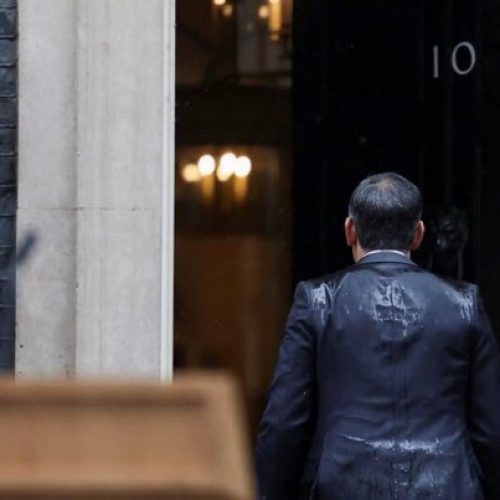The Prime Minister Rishi Sunak has announced a snap general election on 4 July. Since he assumed office in October 2022, Sunak’s premiership has been characterised by its impotence, indecisiveness and division. The PM whom ‘the markets trust’ has distinguished himself as the quintessential administrator for the managed decline of Britain. Several initiatives and projects proposed by the Conservatives, touted to revive productivity and stimulate an upturn in workers’ salaries and prospects, such as high-speed rail connections across much of Northern England, or the ‘levelling up’ investment fund, have been left to languish, undelivered and ultimately cancelled.
The Conservative party secured a hefty 80 seat majority at the last general election in 2019, led by Boris Johnson. The Labour party, main challenger to the Conservatives, betrayed the popular support for its programme by calling for a second Brexit referendum, in the vain hope of assuaging a neurotic and backwards milieu of journalists, lobbyists and celebrities. This shift in priorities was perceived as a re-abandonment of the working class, and millions withdrew their support. The result was an electoral landslide victory that no Conservative politician had achieved since Margaret Thatcher in 1983.
Years of scandal and ineptitude have seen the Conservatives disintegrate and end up squandering their term in government. The combined instabilities that weakened the Conservatives allowed Sunak, a deeply unpopular figure, to assume power. Lacking the public personality and charisma wielded by Johnson, his own party knew Sunak was on borrowed time, and desperately tried to replace him at any opportunity. Sunak persisted, whilst the opposition charmed the establishment and absconded any commitment to the working people of Britain.
Pivoting to the right and reaffirming neoliberal orthodoxies, Labour under Keir Starmer has repositioned itself to the ruling class as a more reliable manager for British capitalism. By signalling their opposition to the remotest possibility of economic transformation, the bourgeois media has reciprocated by giving Starmer favourable coverage over the last year. Labour has now been anointed, ready to replace the present regime.
Most young workers have only known the Britain of Cameron, May, Johnson, Truss and Sunak. This snap election is likely to mark an end to the Conservatives’ fourteen years in power. But when both major parties are offering materially identical programmes, with some superficially different, non-solutions to the declining living standards, dereliction of communities, diminishing prospects and immiseration of our people, we ask what is there to be won? It is worth reminding ourselves that the Labour government defeated in 2010, was one that had spent thirteen years in power. Like the Labour party we see today, they secured their government by denouncing any form of class politics. They convinced the ruling class they were no challenge to their hegemony. They oversaw the exploitation of our class and threw our country into a war of naked imperialism.
The most remarkable aspect of this snap election is how unremarkable it is in the grand context. We have always lived under two governing parties, nodded into power because they fundamentally adhere to the same principles. 4 July will see this assessment ring true.
Across Britain, Communist Party candidates will stand in the election, using the platform afforded to them to express the discontentment of the people with parliament. it is crucial to use this next month to promote a genuine proletarian programme. Young workers know our future will not be uplifted by the magnanimity of those in Westminster, nor by futile attempts to bring about change simply through the ballot box.
We must instead set about the long and difficult road of empowering workers to unite and directly confront the capitalist class; building up real, practical victories. The combined strengthening of our people’s resolve and consciousness, must then be channelled to establishing a revolutionary workers’ state. Such a reorganisation of our society is what we must fight for: a real democracy, that acts in the material interests of ordinary people.
Central Committee
Young Communist League
23 May 2024
London, Britain
